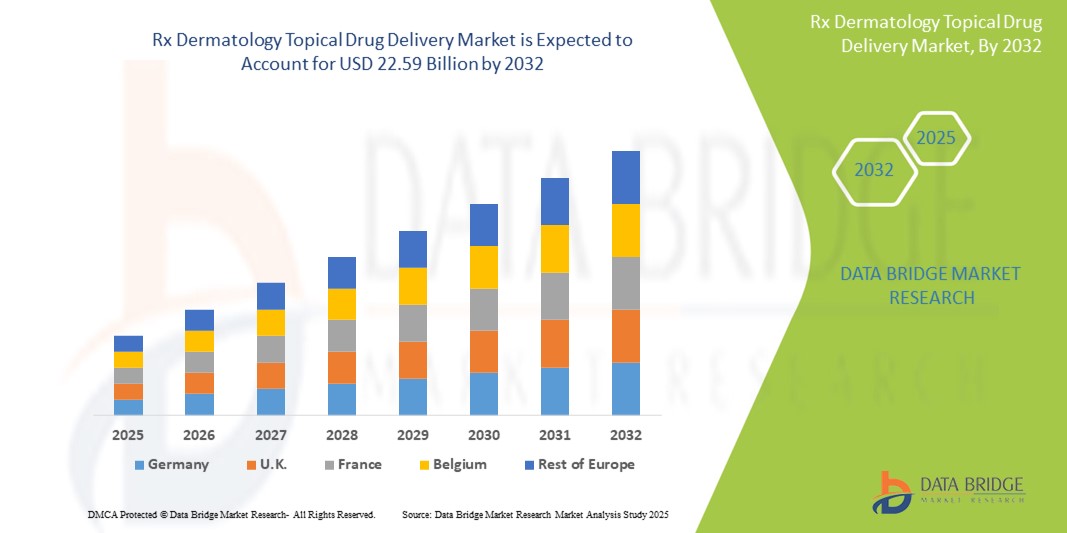Europe Rx Dermatology Topical Drug Delivery Market
Market Size in USD Billion
CAGR :
% 
 USD
12.47 Billion
USD
22.59 Billion
2024
2032
USD
12.47 Billion
USD
22.59 Billion
2024
2032
| 2025 –2032 | |
| USD 12.47 Billion | |
| USD 22.59 Billion | |
|
|
|
|
Rx Dermatology Topical Drug Delivery Market Size
- The Europe Rx Dermatology Topical Drug Delivery market size was valued at USD 12.47 billion in 2024 and is expected to reach USD 22.59 billion by 2032, at a CAGR of 8.7% during the forecast period
- This growth is driven by increasing burden of dermatological disorders, rising cosmetic dermatology demand, and rapid expansion of e-pharmacy and outpatient skincare services across developing economies.
Rx Dermatology Topical Drug Delivery Market Analysis
- Topical drug delivery in prescription dermatology refers to application of active pharmaceutical ingredients to the skin for local or systemic therapeutic effects. Key product types include corticosteroids, antibiotics, antifungals, calcineurin inhibitors, and newer retinoid-based therapies.
- The market is growing due to demand for non-invasive treatments, better compliance with topical formulations, and rising awareness about skin hygiene and chronic skin conditions. Innovations in nanocarrier systems, improved bioavailability, and hybrid cosmeceutical formulations are key technological advancements.
- Germany is projected to lead the Europe market due to its strong healthcare infrastructure, high awareness regarding dermatological disorders, and widespread reimbursement coverage for prescription topical drugs.
- France and Italy are expected to follow, driven by growing geriatric populations and increased product innovation from domestic manufacturers. The UK and Scandinavian countries are also witnessing growth due to digital dermatology services and biosimilar approvals.
Report Scope and Rx Dermatology Topical Drug Delivery Market Segmentation
|
Attributes |
Rx Dermatology Topical Drug Delivery Key Market Insights |
|
Segments Covered |
By Product Type: Corticosteroids, Anti-inflammatory Agents, Antifungal Agents, Anti-acne Agents, Immunomodulators, and Others By Formulation: Creams, Ointments, Gels, Lotions, Sprays, and Others By Distribution Channel: Hospital Pharmacies, Retail Pharmacies, and Online Pharmacies By Indication: Psoriasis, Acne, Dermatitis, Fungal Infections, and Others By End User: Hospitals, Dermatology Clinics, Homecare, and Others |
|
Countries Covered |
Europe
|
|
Key Market Players |
|
|
Market Opportunities |
|
|
Value Added Data Infosets |
In addition to the insights on market scenarios such as market value, growth rate, segmentation, geographical coverage, and major players, the market reports curated by the Data Bridge Market Research also include import export analysis, production capacity overview, production consumption analysis, price trend analysis, climate change scenario, supply chain analysis, value chain analysis, raw material/consumables overview, vendor selection criteria, PESTLE Analysis, Porter Analysis, and regulatory framework. |
Rx Dermatology Topical Drug Delivery Market Trends
“Emergence of Advanced Topical Biologic Formulations”
- The Europe market is witnessing a rapid evolution in prescription topical drug design with the integration of biologically active ingredients and next-generation drug delivery mechanisms. Pharmaceutical companies are increasingly investing in nanotechnology-based systems such as liposomes, solid lipid nanoparticles, and nanoemulsions to enhance percutaneous absorption, stability, and targeted delivery of active agents.
- A notable advancement is the development of topical Janus kinase (JAK) inhibitors for the treatment of atopic dermatitis and other inflammatory dermatoses, offering targeted immune modulation with minimal systemic exposure. Furthermore, transdermal delivery patches embedded with precision dosing technologies are gaining momentum in the management of chronic skin conditions such as plaque psoriasis and vitiligo. These systems allow for sustained release and reduced application frequency, improving patient adherence and therapeutic outcomes.
- This convergence of biologics, advanced materials, and digital health is setting a new benchmark for efficacy, safety, and personalization in the Europe topical drug delivery landscape.
Rx Dermatology Topical Drug Delivery Market Dynamics
Driver
“High Burden of Chronic Skin Disorders and Improved Access”
- The Europe region is characterized by a high prevalence of chronic skin conditions including atopic dermatitis, acne, psoriasis, and fungal infections, driven by environmental factors, lifestyle changes, and growing urbanization. Increased pollution levels, humid tropical climates, and rising stress levels have contributed to a surge in dermatological consultations. Governments and private healthcare providers are actively working to bridge the treatment gap by improving accessibility to dermatological care in underserved regions.
- Access to prescription topical medications has significantly improved due to the proliferation of dermatology outpatient departments (OPDs), awareness campaigns on skin health, and the expansion of dermatology services through telehealth platforms. Public-private partnerships and inclusion of skin care under national healthcare schemes have also strengthened early diagnosis and treatment.
- For instance, in 2024, Germany’s national eHealth platform expanded dermatology access in rural regions, resulting in a 28% increase in prescription topical drug utilization.
Opportunity
“Technological Advancements in Topical Drug Delivery Systems”
- The demand for more efficient, patient-friendly, and targeted topical therapies is driving innovation in drug delivery systems. Pharmaceutical companies are leveraging microencapsulation, microneedle patches, pH-sensitive polymers, and smart hydrogels to improve therapeutic efficacy and patient compliance. These systems allow for localized drug delivery with sustained release profiles, reduced dosing frequency, and minimal systemic side effects.
- The integration of these technologies with personalized medicine—where patient-specific formulations are created based on skin type, genetic markers, and disease progression—is expected to revolutionize dermatological therapy. Moreover, wearable drug delivery devices that integrate with digital health platforms are also emerging as a frontier in managing chronic skin diseases.
- For instance, in February 2025, Galderma introduced a hybrid nano-liposomal system for psoriasis cream in France, enabling enhanced drug permeation and patient adherence
Restraint/Challenge
“High Cost and Regulatory Delays for Novel Topical Formulations”
- Despite the promising efficacy of advanced prescription topicals, high development and manufacturing costs pose a barrier to mass adoption—particularly in middle- and low-income countries. The cost burden of biologics, peptide-based therapies, and nanocarrier formulations is often transferred to patients due to limited insurance coverage. Additionally, regulatory delays in product approval—owing to complex clinical data requirements, lack of harmonized protocols, and limited regional trial infrastructure—slow down market entry.
- Another major challenge is the availability of over-the-counter (OTC) alternatives and unregulated cosmetic-grade formulations, which diminish the demand for prescription products. Low dermatology awareness and shortage of trained specialists further exacerbate delayed diagnosis and underutilization of effective treatments in rural regions.
- For instance, a 2023 report by the European Dermatology Society cited delayed market authorization for novel topical biologics in Turkey and the Balkans due to non-harmonized approval frameworks.
Rx Dermatology Topical Drug Delivery Market Scope
The market is segmented on the basis of product type, formulation, distribution channel, indication, and end user.
|
Segmentation |
Sub-Segmentation |
|
By Product Type |
|
|
By Formulation |
|
|
By Distribution Channel |
|
|
By Indication |
|
|
By End User
|
|
In 2025, the Corticosteroids segment is projected to dominate the market with the largest share in drug class segment
In 2025, the Corticosteroids segment is expected to hold the largest share of 42.5%, due to their established use, efficacy in inflammation management, and wide prescription base across dermatology indications.
The Acne segment is expected to account for the largest share during the forecast period in disease type segment
In 2025, the Acne segment is anticipated to capture a 63.4% share, driven by High prevalence of acne among adolescents and young adults and availability of a wide range of effective prescription topicals contribute to segment leadership.
Rx Dermatology Topical Drug Delivery Market Regional Analysis
““Germany Holds the Largest Share in the Rx Dermatology Topical Drug Delivery Market”
• Germany dominates due to increasing dermatology-focused healthcare infrastructure, expanding middle-class skin care demand, and supportive generic drug manufacturing ecosystem.
“France is Projected to Register the Highest CAGR in the Rx Dermatology Topical Drug Deliver Market”
• France’s market is driven by advanced delivery technologies, aesthetic dermatology overlap, and consumer preference for prescription-grade skincare.
Rx Dermatology Topical Drug Delivery Market Share
The market competitive landscape provides details by competitor. Details included are company overview, company financials, revenue generated, market potential, investment in research and development, new market initiatives, Europe presence, production sites and facilities, production capacities, company strengths and weaknesses, product launch, product width and breadth, application dominance. The above data points provided are only related to the companies' focU.S. related to market.
The Major Market Leaders Operating in the Market Are:
- GlaxoSmithKline Plc (UK)
- Johnson & Johnson Services, Inc. (U.S.)
- Novartis AG (Switzerland)
- Pfizer Inc. (U.S.)
- LEO Pharma A/S (Denmark)
- Sun Pharmaceutical IndU.S.tries Ltd. (India)
- Medimetriks Pharmaceuticals, Inc. (U.S.)
- BaU.S.ch Health Companies Inc. (Canada)
- Galderma SA (Switzerland)
- Mylan N.V. (U.S.)
Latest Developments in Europe Rx Dermatology Topical Drug Delivery Market
- In February 2025, Sun Pharma launched an affordable prescription-grade anti-inflammatory gel in India.
- In March 2025, Novartis received South Korean regulatory clearance for its topical JAK inhibitor.
- In January 2025, LEO Pharma developed a new anti-psoriatic cream with improved photostability in Japan.
- In April 2025, Galderma opened its Singapore R&D lab focusing on smart topical delivery systems.
SKU-
Get online access to the report on the World's First Market Intelligence Cloud
- Interactive Data Analysis Dashboard
- Company Analysis Dashboard for high growth potential opportunities
- Research Analyst Access for customization & queries
- Competitor Analysis with Interactive dashboard
- Latest News, Updates & Trend analysis
- Harness the Power of Benchmark Analysis for Comprehensive Competitor Tracking
Research Methodology
Data collection and base year analysis are done using data collection modules with large sample sizes. The stage includes obtaining market information or related data through various sources and strategies. It includes examining and planning all the data acquired from the past in advance. It likewise envelops the examination of information inconsistencies seen across different information sources. The market data is analysed and estimated using market statistical and coherent models. Also, market share analysis and key trend analysis are the major success factors in the market report. To know more, please request an analyst call or drop down your inquiry.
The key research methodology used by DBMR research team is data triangulation which involves data mining, analysis of the impact of data variables on the market and primary (industry expert) validation. Data models include Vendor Positioning Grid, Market Time Line Analysis, Market Overview and Guide, Company Positioning Grid, Patent Analysis, Pricing Analysis, Company Market Share Analysis, Standards of Measurement, Global versus Regional and Vendor Share Analysis. To know more about the research methodology, drop in an inquiry to speak to our industry experts.
Customization Available
Data Bridge Market Research is a leader in advanced formative research. We take pride in servicing our existing and new customers with data and analysis that match and suits their goal. The report can be customized to include price trend analysis of target brands understanding the market for additional countries (ask for the list of countries), clinical trial results data, literature review, refurbished market and product base analysis. Market analysis of target competitors can be analyzed from technology-based analysis to market portfolio strategies. We can add as many competitors that you require data about in the format and data style you are looking for. Our team of analysts can also provide you data in crude raw excel files pivot tables (Fact book) or can assist you in creating presentations from the data sets available in the report.














